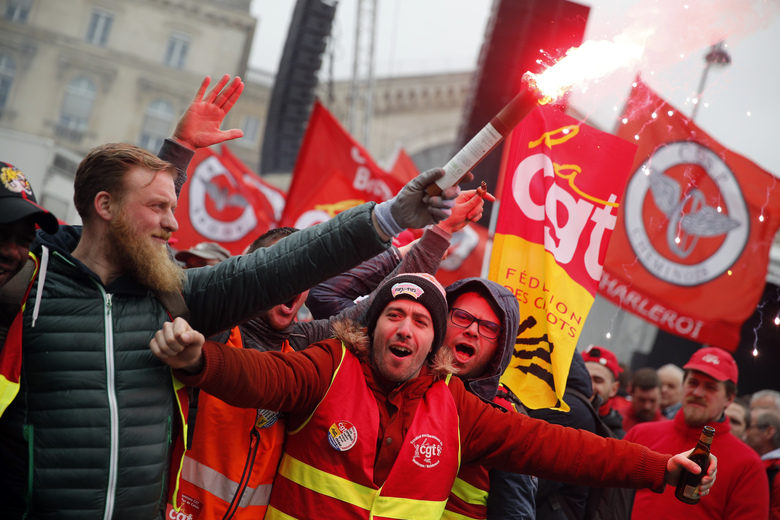France protests labour reforms
March 23, 2018 | Expert Insights

Over 300,000 workers and students took to the streets of France on Thursday, to protest the Macron government’s proposed public sector labour reforms. The French President, elected last year, campaigned on the promise of economic change. Macron has already implemented a number of workplace laws and promised to cut approximately 120,000 government jobs by 2022.
Background
Emmanuel Macron won the French Presidential election on May 7, 2017. At 39, he was the youngest President the nation has seen. Despite being a relative newcomer to politics, he was able to position himself as a staunch centrist. He established a new political group, the La République En March, and his campaign was based on economic reforms. Macron has described his own politics as “progressive” and promised to overhaul rigid French labour laws to tackle unemployment in France.
The French Labour Code has been a source of concern for employers in the past but the highly powerful labour unions in the country hold its protections sacred. Running over 3,000 pages, the code has been described as indecipherable in parts. 170 pages of the rules deal with firing employees, 420 pages deal with health and security regulations. 85 pages tackle collective negotiations and 50 pages are dedicated to temporary work. Employers in the nation have often complained that these rules make it harder for them to hire new employees since it is expensive. It is also difficult (and expensive) to fire employees.
Macron, who has positioned himself as pro-business, is sympathetic to the complaints, and vowed to loosen up the rules. On September 22nd, 2017, the French President signed five major decrees reforming a number of labour rules. The law increased flexibility in the private sector, allowing negotiable wages rather than industrywide agreements. The law also capped dismissal awards, and allowed workplace referendums. Macron described it as an “unprecedented transformation of our social and economic model.”
The French unemployment rate has come down in recent months. As of 2017, it stood at 9.5%. Macron has vowed to reduce the unemployment to 7% by the end of his term.

Analysis
Widespread protests erupted in France on Thursday, as public-sector workers protested the government’s economic reform plans. Over 300,000 workers and students joined in strikes across the country. As a result of the strikes, a large portion of France’s public services were down, including schools and transport. Approximately 30% of all flights and 40% of other transport services were cancelled.
The demonstrations were sparked by Macron’s promise to cut over 100,000 government jobs. They also mark the 50th anniversary of the iconic 1968 protests, where students and workers across the country took to the streets and brought in widespread reform.
Employees of France’s state-owned rail company (SNCF) have joined other civil servants in protests against Macron’s policies. Macron has proposed amendments to the government benefits received by railway workers, who currently have generous pension plans, amongst other perks. Rail unions announced their intention to stage a series of rolling strikes through the month of April.
Unions have complained about the government’s unwillingness to compromise on any of the changes. “We are obviously keeping a listening attitude, but also a very big determination to pursue the transformation,” government spokesperson Benjamin Griveaux said on Wednesday.
Previous attempts to overhaul the SNCF have failed. In 1995, Alian Juppe’s attempt to save on costs by cutting benefits received by employees of the SNCF, were met with three weeks of worker’s strikes. Juppe was forced to withdraw the proposal. “What we need to avoid is that all the grievances fuse together, as was the case in 1995," a government official told Reuters. "The situation is very different from 1995. At the time there was a big discrepancy with what the government had promised during the elections and what they eventually did."
Public opinion on the SNCF reforms has been mixed. According to one survey, approximately 50% of the population supports the worker’s strike. However, this does not include private sector employees, who oppose it. A different survey indicates that while a large portion of the population supports the strikes, the larger majority has a positive stance on governmental reforms. Additionally, Macron’s popularity ratings are at an all-time low. According to polls by BVA, his approval rating has fallen by 12% to 40% since the end of 2017.
Assessment
Our assessment is that Macron’s response to the ongoing protests may set the tone for the remainder of his five-year Presidency. The privatization of the government sectors is a major concern and the state may have to tread carefully. However, wider public opinion is not against President Macron’s reforms. We have previously stated our belief that Macron has a greater chance than any of his predecessors to overhaul France’s rigid labour laws.








Comments